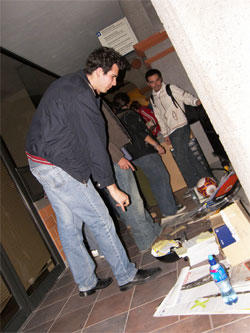Read past stories about TCU’s relationship with UDLA ![]()
The university has put a program with its Mexican sister school on hold, citing free speech and press issues. David Whillock, assistant dean of the College of Communication, said the undergraduate dual degree program with Universidad de las Americas-Puebla is currently on hold.
Conflict arose at the university in January.
– UDLA was put under warning by the Southern Association of Colleges and Schools, an accreditation agency, Jan. 2.
– La Catarina, the university newspaper, was shut down Jan. 16 for 16 days for criticizing administrators, students said.
– Fifteen faculty members and five board of trustees members were removed in April.
Whillock said TCU cannot ignore what is taking place at UDLA.
“It seems like UDLA is being run by a dictator,” Whillock said. “If we’re wrong, then prove it.”
But because TCU’s relationship with UDLA has been established for so long, Whillock said, it would be hard to close the door. Although the relationship isn’t stable now, there could be a good opportunity in the future, he said.
“The relationship is for the students,” Whillock said.
He said TCU has been concerned about the situation at UDLA’s student newspaper, La Catarina, since it shut down and reopened in January. The newspaper is being published again, but UDLA students have said they are still being censored.
“I’ve heard rumors while it’s still open the issues have not been resolved,” Whillock said.
Monica Cruz, former editor in chief of La Catarina, said UDLA and the newspaper staff started discussing its expression of the freedom of speech this summer to ensure its stability.
La Catarina was shut down in January because of cartoons and opinion columns criticizing the university’s administration, Cruz said.
Cruz said the staff asked for a written guarantee of its freedom of speech because of a university code that prohibits publishing anything that would damage the university’s image.
She said while waiting for this guarantee, the university published a new La Catarina on Aug. 29.
“We were replaced,” she said. “The new editor in chief has no experience.”
Whillock said the program would be on hold until UDLA started to value the same things TCU does, such as freedom of speech.
UDLA has also been under a yearlong warning with SACS since Jan. 2 for violating two core requirements.
SACS, which also accredits TCU, reported UDLA’s governing board is not adequate, and the university has not shown financial stability.
In April, five board members were fired and the board of trustees dissolved, said Neil Lindley, former board of trustees member at UDLA. Lindley said this was a “blatant violation of SACS requirements.”
However, Maria Lopez Aguilar, vice director of communication at UDLA, said there would soon be new governing organs at the university and said she didn’t have enough information to comment on the status of the board of trustees.
According to an article from a Puebla newspaper, La Jornada de Oriente, the rector of UDLA, Pedro Angel Palou, announced Sept. 24 a new governing form would take place with an election in October.
Provost Nowell Donovan said if UDLA was to lose its accreditation, discussion about the school’s situation with UDLA would increase.
As of now, Donovan said, TCU is not taking an aggressive approach toward UDLA.
“We’re here and they’re there,” Donovan said. “There’s no reason to do anything.”
Lindley said losing accreditation could lead to UDLA’s closure.
“It is not a light matter,” he said.
Jack Allen, vice president of SACS, said losing accreditation could affect funds a university receives from the U.S. government. The federal government relies on the accrediting associations when considering the allocation of funds, Allen said.
UDLA was accredited before it received federal grants from the U.S., so losing accreditation could mean more than just losing finances, Allen said.
“There’s a certain prestige in being accredited,” Allen said.
UDLA will undergo review with SACS in early December, Allen said.





